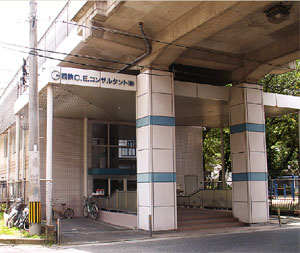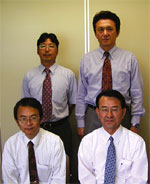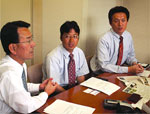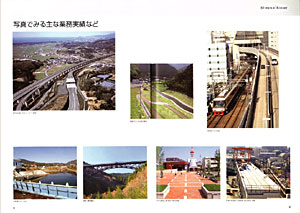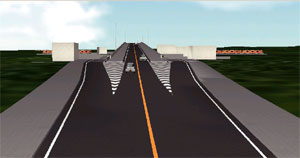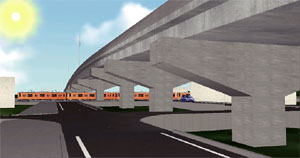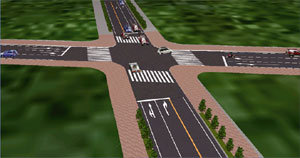NCEC Expects 3-D Real-time VR as a Key to Expansion
Having a wide network ranging from Fukuoka Prefecture to overseas, Nishi-Nippon Railroad Co., Ltd. (Nishitetsu) and its group leads transportation industries along with various derivative fields. Nishitetsu C.E.Consultant Co., Ltd. (NCEC) is a member of Nishitetsu Group specializing in research, survey, planning, and design for civil engineering works.
NCEC has been using Forum8 products and services, especially those related with structural calculation of bridges and roads. Among them, UC-win/Road, a 3-D real-time virtual reality (VR) is expected to be a key tool for business expansion, having been used effectively since last year.
Founded in 1973, Nishitetsu C.E.Consultant Co., Ltd. has been providing civil engineering consulting services with a focus on railroad-related jobs for Nishitetsu. Located in Fukuoka city, where Nishitetsu Group is also headquartered, NCEC maintains two branch offices in Kumamoto and Saga cities and a staff of 64 employees (15 clerical staff and 49 technical staff, as of June 2006).
Typically NCEC's services fall into researches, planning, and design in the following categories: 1) steel structure and concrete, 2) railroad, 3) roads, 4) river works and coast, 5) water supply and sewerage, 6) urban and regional planning, 7) environmental assessment, 8)construction planning and management, 9) soil and geological surveying, 10) surveying, 11) investigation of compensation.
The present organization of the headquarters is composed of clerical departments (General Affairs, Sales, and Engineering) and technical departments (the First Design, the Second Design, the Third Design, and Railway Facilities Planning Office). The First Design Department is dedicated to road; The Second Design Department to survey, river, and sewerage; and the Third Design Department to structures. Railway Facilities Planning Office was established in last April, to integrate and specialize in Nishitetsu-related services ranging from design to maintenance of railroads, which had been included in the Second and Third Design Departments before.
As NCEC was originally founded to support Nishitetsu for developing its infrastructure, Railway Facilities Planning Office has the highest weight among the four technical departments. Under these circumstances, "We, the First Design Department addresses Nishitetsu-related projects, such as an overpass for railroad, along with general road projects," said Toshimi Adachi, director of the First Design, explaining the characteristics of their mission.
"We are willing to produce competitive products by utilizing IT (information technology)," says Adachi.
As a function to embody this, he mentions the activity of the "computer committee," a taskforce organized across the whole company to advance IT to the fullest. The committee is composed of more than ten people. A department is divided into groups of about 4 people, and one committee member represents each group. The committee studies IT from a holistic point of view, sharing information to support utilization of the latest version of in-house IT, as well as coordinating want lists of hardware and software submitted from each group. Moreover, the committee has been using a groupware for several years to build up such environment that enables the whole organization to share the latest information, a revised outline for CALS/EC for example.
The committee has also considered purchase of various kinds of Forum8 software including those related with structures. Especially this year, Fukuoka Prefecture is phasing in electronic delivery based on CALS/EC, following Ministry of Land Infrastructure and Transport (MLIT). While strengthening CAD system for roads to handle this situation, NCEC also started to use 3D CAD system to cope with the future scene of CALS/EC. Tsuguhiko Yoshimura, Deputy Manager of the First Design expresses his intention to use UC-win/Road linked with 3D CAD system.
"Taking a look at the simulation produced by UC-win/Road, we immediately decided to purchase it," said Adachi, remembering how 3D real-time VR effect had impressed him with a shock.
Having started to use Forum8 UC-win/Road last year, NCEC received the first order using it for Hongokiyama Road Project for Kurume Public Works Office of Fukuoka Prefecture. Before, NCEC had been involved with a part of the project section, a road and a bridge where the project overpasses Nishitetsu, from preliminary design phase. Their proposal to use UC-win/Road to develop public presentation materials to communicate the value of the project section for area residents was accepted.
The section is almost 2km long, which includes Nishi-Nippon Railroad itself, overpass part of Hongokiyama Road and its frontage roads on both sides, and crossing roads. Simulation data were created within less than 3 weeks after it was decided to adopt UC-win/Road, representing all the points of "What does Nishitetsu itself look like?" "How does a train run? " "What does a train look like from the overpass?" and "What does the overpass which crosses Nishitetsu look like?" reflecting requirements of the client. The data were delivered in April this year.
In addition to a success in the project using UC-win/Road, the firm marked it for its potential as a tool. At present, NCEC plans to positively utilize this 3-D real-time VR technique as the firm's appealing point in the projects NCEC take part in.
In relation to Omuta Public Works Office of Fukuoka Prefecture, it was offered to NCEC to create perspective drawings for public presentation.
In such a case, it is common that an optimal approach is chosen among perspective drawings, photomontage, and models, depending on the case. However, take a perspective drawing for instance, it limits a point of view to only one, making it unable to view from different angles. Instead, NCEC proposed to use UC-win/Road, not only to solve such a problem, but also to create simulation data of the scene of a driving car, compare data by exchanging various factors, and view a scene from different angles, improving the effect of presentation as a result. Though the proposal is not adopted yet, Yusuke Uchino, Manager of the First Design Department, stated that the client was much interested in this idea and made a positive comment on its use in the future, including with other projects.
"Clients should have recognized the ability of 3D computer graphics (CG) to do such a thing. However, they have been hesitating to use CG as it had been thought to be as expensive as being priced per second," explains Uchino.
Formerly, in addition, it was necessary to prepare the dedicated equipment for motion picture, while limiting to a fixed point of view. Uchino observes that substantial cost reduction realized by UC-win/Road, as well as its ability to view from any optional point of view through an ordinary personal computer, resulted in the client's positive impression.
At present, Nishitetsu is working on a railway-road continuous grade separation project around the stations of Kasugabaru, Shirakibaru, and Shimo-ori along Nishitetsu Omuta line. Each project site is closely related with local residents, making briefing for public hearing very important. Accordingly, NCEC is now considering proposal to use 3-D real-time VR instead of traditional presentation tools such as brochures, based on the aforementioned road-related project's outcome and feedback.
"I hope presentation with motion picture will make it easy for area residents to understand that grade separation would solve traffic jam and realize smooth driving," said Yasunori Hashizume, Managing Director of Nishitetsu C.E.Consultant, expecting it as a solution for consensus building, a matter unsettled so far.
"In this particular time when public works face harsh environment, we are willing to appeal our unique approach that corresponds to new needs, based on our knowledge as well as the clients' confidence in us as a member of Nishitetsu Group," explains Adachi about his visions about the future expansion.
One of the visions is to get involved in the maintenance and repairs of increasing stocks as a civil engineering consultant. Another one is to provide unique services using such a tool as UC-win/Road. To realize this, Yoshimura says that skill training will be planned so that UC-win/Road data can be generated at any time within the company.
Also, as CALS/EC shifts through a new phase, NCEC is planning to share increasing electronic information throughout the company and utilize it effectively. One of the challenges that realize this aim is promoting paperless documentation as a whole company.
"I think our achievement has been well evaluated so far; now it's going to be important to present the outcome with an easy-to-understand material," says Hashizume, adding that in this sense it is significant in a marketing strategy to adopt such a tool as UC-win/Road ahead of competitors. He continues that, based on the idea that IT is a tool to make products' quality higher through easier job, it will be a business policy to position IT as a total system not only to deal with individual needs but also to operate the whole."
